 Dr. Veith's musings on the Lutheran-based humor of Garrison Keillor (which were triggered by his own comments on Lutheran Invisibility) got me thinking about my personal favorite of Keillor on Lutherans. I refer to The Young Lutheran's Guide to the Orchestra, in which he carefully evaluates which instruments are suitable for the heirs of Wittenberg to play.
Dr. Veith's musings on the Lutheran-based humor of Garrison Keillor (which were triggered by his own comments on Lutheran Invisibility) got me thinking about my personal favorite of Keillor on Lutherans. I refer to The Young Lutheran's Guide to the Orchestra, in which he carefully evaluates which instruments are suitable for the heirs of Wittenberg to play.A number of sites list it, I'll point you to a couple after a few quotes, including comments on some of the individual instruments.
Intro: "To each person, God gives some talent such as comedy, just to name one, or the ability to suffer, and to some persons God has given musical talent, though not to as many as think so. So for a young Lutheran considering an orchestral career, the first question to ask yourself is, 'Do I have a genuine God-given talent, or do I only seem talented compared to other young Lutherans?' Because most Lutherans aren't musicians, they're choir members. Mostly altos and basses. And they can be sure that their gift is God-given, because who else but God would be interested? Nobody goes into choir music for the wrong reasons. But orchestra... do you know what you're getting into? You're getting into opera for one thing. Don Juan and Mephistopheles, pagan goddesses screeching and being strangled and thrown off balconies. And even if you stick to concert music, where are the Christian composers? Modern ones are existentialists, the romantics were secular humanists, the 18th century was all rationalists, and the 17th were Italian except for Bach. And you can't make a living playing Bach."
French Horn: "In some orchestras, the horn players are required to be celibate — sometimes by their wives."
Clarinet: "Many Lutherans start out playing clarinets in marching band and think of it as a pretty good instrument and kind of sociable. You pick up a clarinet, and you feel like getting together with other people and forming an 'M'. But the symphonic clarinet is different: clever, sarcastic, kind of snooty."
Oboe: "You start playing the oboe, you're going to have babies, take my word for it."
Flute: "It's like soloing on a pop bottle. The problem with the flute is that it vibrates your brain, and you start wearing big white caftans and smocks and eat roots and berries."
Bass: "A very deliberate instrument ... bass players do tend to be more methodical, not so spontaneous or witty or brilliant necessarily, but reliable. Which makes the instrument appealing to German Lutherans."
Viola: "I know violists and they're okay until late at night, they like to build a fire in a vacant lot and drink red wine and roast a chicken on a clothes hanger and talk about going to Mexico with somebody named Rita."
First Violin: "Did our Lord say, 'Blessed are they who stand up in front and take deep bows for they shall receive bigger fees?'"
Tuba: "The tuba player is normally a stocky, bearded guy whose hobby is plumbing. The only member of the orchestra who bowls over 250 and gets his deer every year and changes his own oil. In his locker downstairs, he keeps a pair of lederhosen for free-lance jobs."
Trumpet: "[Trumpeters] want to wear capes and swords and tassels; they want to play as loud as they can and see mallards drop from the ceiling."
Percussion: "There are two places in the orchestra for a Lutheran and one is the percussion section."
Harp: "It's an instrument for a saint. If a harpist could find a good percussionist, they wouldn't need anybody else. They could settle down and make perfectly good music, just the two of them."
For the full text, head to Boys Art Music, where you can order the CD Lake Wobegon Loyalty Days: A Recital for Mixed Baritone and Orchestra or download the libretto in ZIP or binhex.
 Today we celebrate the Feast of Saint Andrew, Apostle of our Lord Jesus Christ. Most New Testament references include him on a list of the Twelve Apostles or group him with his brother, Simon Peter. But we see him acting as an individual three times. When a number of Greeks (or Greek-speaking Jews) wished to speak with Jesus, they approached Philip, who told Andrew, and the two of them told Jesus (John 12:20-22). Since "Philip" and "Andrew" are Greek names, these petitioners may have sought them out. Before Jesus fed the Five Thousand, Andrew said, "There is a boy here who has five barley loaves and two fish, but what are they for so many? (John 6:9 ESV)"
Today we celebrate the Feast of Saint Andrew, Apostle of our Lord Jesus Christ. Most New Testament references include him on a list of the Twelve Apostles or group him with his brother, Simon Peter. But we see him acting as an individual three times. When a number of Greeks (or Greek-speaking Jews) wished to speak with Jesus, they approached Philip, who told Andrew, and the two of them told Jesus (John 12:20-22). Since "Philip" and "Andrew" are Greek names, these petitioners may have sought them out. Before Jesus fed the Five Thousand, Andrew said, "There is a boy here who has five barley loaves and two fish, but what are they for so many? (John 6:9 ESV)"The first two disciples whom John reports as attaching themselves to Jesus (John 1:35-42) are Andrew and another disciple (unnamed, but commonly supposed to be John himself — John never mentioned himself by name, a widespread literary convention). After meeting Jesus, Andrew found his brother Simon and brought him to Jesus. Thus, on each occasion when he is mentioned as an individual, we see him bringing others to meet the Savior.
Just as Andrew was the first of the Apostles, so the Western Church uses his feast to mark the beginning of the Church Year. The First Sunday of Advent is defined as the Sunday on or nearest his feast.
 Scotland considers Andrew to be its national saint. Meanwhile, George (23 April), Patrick (17 March), and Dewi (1 March) fill these roles for England, Ireland, and Wales, respectively. George, a soldier, is customarily pictured as a knight with a shield that bears a red cross on a white background. This became the national flag of England.
Scotland considers Andrew to be its national saint. Meanwhile, George (23 April), Patrick (17 March), and Dewi (1 March) fill these roles for England, Ireland, and Wales, respectively. George, a soldier, is customarily pictured as a knight with a shield that bears a red cross on a white background. This became the national flag of England.Tradition says that Andrew was crucified on a Cross Saltire — an "X"-shaped cross, which became his symbol and later, the national flag of Scotland. One symbol of Patrick is a red cross saltire on a white background. The crosses of George and Andrew were combined to form the Union Jack, or flag of Great Britain; later the cross of Patrick was added to form the present Union Jack.
Alas, poor Wales ... it doesn't appear on the British flag, perhaps because Dewi didn't have such a representative symbol.
Lection
Psalm 139:1-20 or Psalm 19:1-6
Deuteronomy 30:11-14 or Ezekiel 3:16-21
Romans 10:(8-9)10-18
Matthew 4:18-22 or John 1:35-42
Collect
Almighty God, by whose grace the blessed apostle Saint Andrew obeyed the call of Your Son Jesus Christ, grant us also to follow Him in heart and life; through Jesus Christ, Your Son, our Lord, who lives and reigns with You and the Holy Spirit, one God, now and forever. Amen.
 Today begins the solemn season of Advent, a preparatory period as Christians ready themselves for both the celebration of Christ's coming at Bethlehem and His Second Coming on Judgment Day.
Today begins the solemn season of Advent, a preparatory period as Christians ready themselves for both the celebration of Christ's coming at Bethlehem and His Second Coming on Judgment Day.For more on this part of the Church Year, the so-called "three-fold coming of Christ," and Advent as tonic for improper celebration of Christmas, please see Happy New Year! at Ask the Pastor.
I've decided this year to skip a special theme for the midweek services. Instead, I'll be preaching on the week's Old Testament reading each Sunday and on the Gospel each Wednesday. No, it's not so much that I'm binding myself totally to the Lectionary (although that's not a bad thing) as it is that Advent has come so quickly (wasn't Easter just a couple months ago?) that I didn't have time to adequately prepare an integrated sermon series.
| The Lord You scored 26% Cardinal, 53% Monk, 38% Lady, and 54% Knight! |
| You are of the intellectual breed and yet you are also very interested in war. You are of the aristocracy and head the cavalry a safe distance from the carnage of the front lines. You believe in defeating your enemy with not only might, but also wit. You scored high as both the Monk and the Knight. You can try again to get a more precise description of either the Monk or the Knight, or you can be happy that you're an individual. |
| Link: The Who Would You Be in 1400 AD Test written by KnightlyKnave on Ok Cupid, home of the 32-Type Dating Test |
HT: The Uneasy Priest
Winners may claim, copy, download, upload, link, and gloat as they so choose, according to the award's charter.
‡ First of all, we cross the pond to The First British Lutheran Blog Ever, wherein Chris Williams opines, "This world" seldom is "actually mocking genuine Christianity." In They mock what they don't understand? Do they? he explains that many secular assaults are actually against parts of "Christendom" that aren't all that Christian.
‡ Hot Under the Collar provides good Lutheran perspective on religion in the public schools in Removers vs. Restorers.
‡ In Lord of the Vocations: Part I, Kelly Klages of Kelly's Blog examines J. R. R. Tolkien's understanding of a woman's vocation and contrasts it with that shown in the film trilogy and exhibited in modern society.
‡ In case you haven't noticed poor Ryan at Wretched of the Earth — he's stuck in Thailand without his favorite sports and must live on memories and imaginings.
‡ The Hot Lutheran on Lutheran Action I salute involves the post Lex Orandi, Lex Credendi ... Experience Theology?, wherein Sean strikes up his personal praise band for the historic Liturgy and its intertwined relationship of doctrine and practice.
‡ In a related article, St. James the Hoosier discusses the difficulty of drawing any exact lines of demarcation in the LCMS regarding what is or isn't Lutheran in worship practice as he asks, Who Are We? Make sure to read the comments and follow the links to see from whence the comments proceed.
‡ As we IM or otherwise chat on the internet, we "LOL" all too often, even if the comment actually only provokes a modest grin. However, when I read The Pastor-Organist Tension by Pastor Petersen at CyberStones, I truly did LOL. I went back today and discovered fresh comments, which only added to my chuckles.
‡ Finally, although they're both a bit young for the appellation, I've bestowed a sort of "Lifetime Aachievement Aaward" upon Random Dan and Intolerant Elle. Thus, they receive a brace of Aardies for the work they put in on the Lutheran Carnival. Without them, the Carnival never would have seen the light of day. Without their continued involvement, it would have already died a slow, painful death.
That's it for this time. Congratulations to all the winners.
Here's a collection of posts for and about Thanksgiving Day garnered from my blogroll. Some are Lutheran, some aren't. Some are religious, some secular, some serious, some humorous. There are sermons, essay, recollections, and family celebrations.
Enjoy!
Aardvark Alley
Ask the Pastor
Humorist Dave Barry
Beggars All
Pastor Steve Billings
Blog from Mossback Meadow
The Burr in the Burgh
The Carib Pundit and more Carib Pundit
Cranach
The Crazy Rants of Samantha Burns
Pastor Bill Cwirla
Vicar Charles Lehmann
The Grateful Christian
Jottings and Such
Katie's Beer
Pastor Brent Kuhlman
Living Among Mysteries
Love & Blunder
Pastor Todd Peperkorn
Preachrblog
Pro-Life Blogs
Scottius Maximus
Pastor Bill Weedon
David Yow
And, just for fun, a little game from Blogthings, asking What Part of Thanksgiving Are You?
Another year, another day to stop and say, "Thanks." Of course, we don't need to be reminded to be thankful, do we? God doesn't need to encourage our living lives of love and trust in response to His mighty deeds, does He? Sad to say, we do and He does.
How many blessings has God already given you? How many times have you been truly thankful? How many times have you acted like you deserve the favorable treatment? How many times have you gone on without so much as a token nod to the Giver of all good?
Are we any better than those who've gone before us? Consider the lepers Jesus healed (Luke 17). All ten were cleansed (v. 14). Jesus sent them to the priests who were required to declare them ritually clean (see Leviticus 13). However, nothing either in the Scriptures or Christ's command prohibited them from returning first to the One who saved them from lives as outcasts. We don't know the motivation of those who kept going; we do know that one came back, "And he fell on his face at Jesus' feet, giving Him thanks. (v. 16)"
Jesus pointed out that the returning man was a Samaritan, not an Israelite. Why would God's covenant people — "church people" — continue on rather than first returning? Yet this one, whose people had removed themselves from Israel, demonstrated faith that grasped the blessings of God.
Even when they show initial thankfulness, God's children have a poor record of continuing in the same spirit. Israel, following the Red Sea crossing, sang and celebrated, praising and thanking the Lord for His divine rescue. Yet only three days later they complained about the bitter waters of Marah (Exodus 15:22-25). Satisfied by the miracle of sweetened water, they soon started doubting God's providence, whining about not having food, blaming Moses and Aaron for bringing them out "to kill this whole assembly with hunger. (Ex 16:3)" In response, God sent His manna.
Time and again, rather than thinking, speaking, and acting in thankfulness, God's people forget about His blessings and focus on their problems. Yet God provides a few heroes of the Faith who have the strength to thank Him even in times of trouble.
Martin Rinckart, a Lutheran minister during the 1600s, was called to pastor Eilenburg, Germany just before the Thirty Years War began and served until right after hostilities ceased. Eilenburg was a walled city where refugees sought protection. Thousands of citizens and sojourners died of famine or plague; one of these was his wife. Much of the time, Rinckart was the only pastor, sometimes doing burial services for as many as seventy people in one day. Catholic Austrians sacked the city; so did Lutheran Swedes. Yet in the midst of all this, Rinckart was able to give thanks to the Lord.
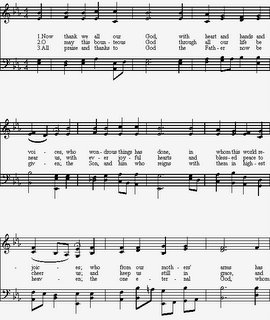 In the heart of the hostilities, Rinckart penned one of the Church's enduring songs of faithfulness and thanksgiving. In our times of trouble, we can make it our own prayer: "Now thank we all our God With hearts and hands and voices, Who wondrous things has done, In whom His world rejoices; Who from our mother's arms Has blessed us on our way With countless gifts of love And still is ours today."
In the heart of the hostilities, Rinckart penned one of the Church's enduring songs of faithfulness and thanksgiving. In our times of trouble, we can make it our own prayer: "Now thank we all our God With hearts and hands and voices, Who wondrous things has done, In whom His world rejoices; Who from our mother's arms Has blessed us on our way With countless gifts of love And still is ours today."Rinckart didn't look at the losses he or others had suffered. Instead, he focused on God's divine presence each day and the promise of eternal bliss: "Oh, may this bounteous God Through all our life be near us, With ever joyful hearts and blessed peace to cheer us And keep us in His grace And guide us when perplexed And free us from all harm In this world and the next."
In the midst of death and destruction, Rinckart focused on the God of grace who faithfully keeps His promises. With unbridled joy, he bids us join the choir: "All praise and thanks to God The Father now be given, The Son, and Him who reigns With them in highest heaven. The one eternal God, Whom earth and heav'n adore; For thus it was, is now, And shall be evermore."
Scripture quoted from the English Standard Version (ESV).
 Saint Clement of Rome, Pastor and Bishop (ca. A.D. 35–100) is remembered for establishing the pattern of apostolic authority that governed the Christian Church during the first and second centuries. He insisted on keeping Christ at the center of the Church's worship and outreach. In a letter to the Corinthian Christians, he emphasized the centrality of Jesus' death and resurrection: "Let us fix our eyes on the blood of Christ, realizing how precious it is to His Father, since it was poured out for our salvation and brought the grace of repentance to the whole world" (1 Clement 6:31).
Saint Clement of Rome, Pastor and Bishop (ca. A.D. 35–100) is remembered for establishing the pattern of apostolic authority that governed the Christian Church during the first and second centuries. He insisted on keeping Christ at the center of the Church's worship and outreach. In a letter to the Corinthian Christians, he emphasized the centrality of Jesus' death and resurrection: "Let us fix our eyes on the blood of Christ, realizing how precious it is to His Father, since it was poured out for our salvation and brought the grace of repentance to the whole world" (1 Clement 6:31).Early accounts claim that he suffered a martyr's death by drowning — specifically, he was said to have been tied to an anchor, hence his normal symbol is an anchor. Before his death, he displayed a steadfast, Christ-like love for all of God's redeemed people, serving as inspiration for future generations to continue building the Church on the foundation of the prophets and apostles, with Christ as the one and only cornerstone. His Epistle to the Corinthians addresses what he considered to be the improper dismissal of a bishop. It works both for good order and for abounding charity among the Corinthian Christians.
Here follows an excerpt from his Epistle to the Corinthians:
Let the one truly possessed by the love of Christ keep his commandments. Who can express the binding power of divine love? Who can find words for the splendor of its beauty? Beyond all description are the heights to which it lifts us. Love unites us to God; "it cancels innumerable sins," has no limits to its endurance, bears everything patiently. Love is neither servile nor arrogant. It does not provoke schisms or form cliques, but always acts in harmony with others. By it all God's chosen ones have been sanctified; without it, it is impossible to please him. Out of love the Lord took us to himself; because he loved us and it was God's will, our Lord Jesus Christ gave his life's blood for us — he gave his body for our body, his soul for our soul.
See then, beloved, what a great and wonderful thing love is, and how inexpressible its perfection. Who are worthy to possess it unless God makes them so? To him therefore we must turn, begging of his mercy that there may be found in us a love free from human partiality and beyond reproach. Every generation from Adam's time to ours has passed away; but those who by God's grace were made perfect in love and have a dwelling now among the saints, and when at last the kingdom of Christ appears, they will be revealed. "Take shelter in your rooms for a little while," says Scripture, "until my wrath subsides. Then I will remember the good days, and will raise you from your graves."
Happy are we, beloved, if love enables us to live in harmony and in the observance of God's commandments, for then it will also gain for us the remission of our sins. Scripture pronounces "happy those whose transgressions are pardoned, whose sins are forgiven. Happy the one," it says, "to whom the Lord imputes no fault, on whose lips there is no guile." This is the blessing given those whom God has chosen through Jesus Christ our Lord. To him be glory for ever and ever.. . .
Let us fix our attention on the blood of Christ and recognize how precious it is to God his Father, since it was shed for our salvation and brought the grace of repentance to all the world.
If we review the various ages of history, we will see that in every generation the Lord has "offered the opportunity of repentance" to any who were willing to turn to him. When Noah preached God's message of repentance, all who listened to him were saved. Jonah told the Ninevites they were going to be destroyed, but when they repented, their prayers gained God's forgiveness for their sins, and they were saved, even though they were not of God's people.
Under the inspiration of the Holy Spirit, the ministers of God's grace have spoken of repentance; indeed, the Master of the whole universe himself spoke of repentance with an oath: "As I live," says the Lord, "I do not wish the death of the sinner but the sinner's repentance." He added this evidence of his goodness: "House of Israel, repent of your wickedness. Tell my people: If their sins should reach from earth to heaven, if they are brighter than scarlet and blacker than sackcloth, you need only turn to me with your whole heart and say, 'Father,' and I will listen to you as to a holy people."
In other words, God wanted all his beloved ones to have the opportunity to repent and he confirmed this desire by his own almighty will. That is why we should obey his sovereign and glorious will and prayerfully entreat his mercy and kindness. We should be suppliant before him and turn to his compassion, rejecting empty works and quarreling and jealousy which only lead to death.
We should be humble in mind, putting aside all arrogance, pride, and foolish anger. Rather, we should act in accordance with the Scriptures, as the Holy Spirit says: "The wise must not glory in wisdom nor the strong in strength nor the rich in riches. Rather, let the one who glories glory in the Lord, by seeking him and doing what is right and just." Recall especially what the Lord Jesus said when he taught gentleness and forbearance. "Be merciful," he said, "so that you may have mercy shown to you. Forgive, so that you may be forgiven. As you treat others, so you will be treated. As you give, so you will receive. As you judge, so you will be judged. As you are kind to others, so you will be treated kindly. The measure of your giving will be the measure of your receiving."
Let these commandments and precepts strengthen us to live in humble obedience to his sacred words. As Scripture asks: "Whom shall I look upon with favor except the humble, peaceful one who trembles at my words?"
Sharing then in the heritage of so many vast and glorious achievements, let us hasten toward the goal of peace, set before us from the beginning. Let us keep our eyes firmly fixed on the Father and Creator of the whole universe, and hold fast to his splendid and transcendent gifts of peace and all his blessings.
Lection
Psalm 78:3-7 or 85:8-13
2 Timothy 2:1-7
Luke 6:37-45
Collect
Almighty God, who chose your servant Clement of Rome to recall the Church in Corinth to obedience and stability, grant that your Church may be grounded and settled in your truth by the indwelling of the Holy Spirit, and may evermore be kept blameless in your service; through Jesus Christ our Lord, who lives and reigns with you and the Holy Spirit, one God, now and forever.
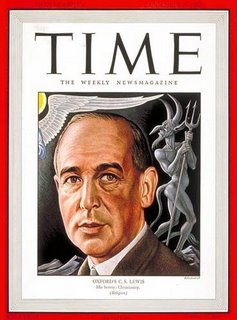 Clive Staples Lewis ("Jack" to his friends) was a tutor and lecturer at Oxford University, and later became Professor of Medieval and Renaissance English Literature at Cambridge University. He may be the most popular modern Christian writer. Many would consider him the most effective English-language explainer and defender (apologist) of Christianity in the last century.
Clive Staples Lewis ("Jack" to his friends) was a tutor and lecturer at Oxford University, and later became Professor of Medieval and Renaissance English Literature at Cambridge University. He may be the most popular modern Christian writer. Many would consider him the most effective English-language explainer and defender (apologist) of Christianity in the last century.Lewis normally tried to avoid extended writing on areas of disputed Christian doctrine, focusing mainly upon those beliefs which Christians hold in common. His work is valued by people in most branches of Christendom.
Lewis was a long-time atheist whose conversion came as he struggled to disprove Christianity once and for all. Instead of overthrowing God's Word, the Holy Spirit used it to convict, convince, and convert him to the truth. Once that happened, Lewis couldn't hold back writing and speaking about the Faith.
Along with his writing, Lewis was also a radio speaker. Some of his over-the-air chats were later published as Mere Christianity, one of his most popular works. He was also part of the Inklings, a noted literary group which included J. R. R. Tolkien and a number of other respected academics and writers.
Here follows a partial list of his works:
Mere Christianity originated as a series of fifteen-minute radio talks addressed to a general audience, giving a general account of Christian belief. It intentionally avoids almost all controverted teachings, hence the "Mere" in the title.
Miracles examines the grounds for supposing whether or something could or would interfere with the workings of Nature with special emphasis upon the Incarnation (God taking human nature upon Himself in the Person of Jesus Christ).
The Problem of Pain undertakes to answer the question of pain and evil in the world if there is a good and omnipotent God.
The Great Divorce is an allegorical dream owing some debt to Dante, wherein the author visits Heaven and Hell. While Lewis provides some descriptive narrative, the focus is upon the meaning of ending up in either place.
The Abolition of Man is a series of three lectures defending the concept of Natural Law.
The Screwtape Letters purport themselves to be a series of letters from experienced devil Screwtape to his nephew Wormwood, a junior tempter on his first assignment. Dealing with the psychology of temptation, the letters can make most readers both laugh and cringe.
Reflections on the Psalms are Lewis's thoughts on questions or problems occurring to him as he prayed and studied the Psalter.
A Preface to Paradise Lost is a series of lectures on epic poetry, especially Milton's "Paradise Lost." While Lewis delivered them as Mediaeval and Renaissance English specialist, they should interest Christians as well as English students, since Lewis maintained that understanding the poem's presupposed beliefs is necessary to understanding and appreciating the poem.
The Space Trilogy consists of three science fiction novels on Christian themes. These are Out of the Silent Planet, Perelandra, and That Hideous Strength.
The Chronicles of Narnia are a series of fantasies, each of which overtly or covertly introduces any number of Christian topics. The books are linked by common characters and cover the entire history of an alternate reality from its creation to its last day and the new life which follows. In order of writing, these books are The Lion, the Witch, and the Wardrobe, Prince Caspian, The Voyage of the Dawn Treader, The Silver Chair, The Horse and His Boy, The Magician's Nephew, and The Last Battle. If one reads them in the order of Narnia's chronology, then The Magician's Nephew would come first.
Letters to Malcolm, Chiefly on Prayer is what the title says.
Till We Have Faces is a novel retelling the story of Eros and Psyche from the viewpoint of one of the sisters.
The Pilgrim's Regress follows somewhat the course charted by Bunyan's The Pilgrim's Progress, telling how a young man, reared a nominal Christian, abandoned his belief, looked for something better, but eventually arrived at a destination alike, but very different from, his starting point.
The Four Loves examines four different uses of the word, based upon four Greek words for kinds of love.
God in the Dock is a posthumous collection of essays, memos, letters to the editor, and the like.
An Experiment in Criticism examines Lewis's understanding of art, particularly literature. Instead of first distinguishing between good and bad books and defining good and bad taste according to one's preference for either type of literature, Lewis reversed the proposition. He asked that we first examine two distinct types of pleasure we might derive from books, music, painting, and the like and then distinguish art based upon the type of pleasure it offers.
Surprised by Joy is an autobiographical account of his conversion. One might think it also a bit prophetic, since it predates his meeting and falling in love with his later-life wife, Joy Gresham.
This brings us to A Grief Observed, which does deal with his wife, particularly with Lewis's reaction to her death from bone cancer. He wrote it under the pseudonym N. W. Clerk but had so many people recommend it to him that he finally publicly established his own authorship.
This is only a partial list, with works I consider to be highlights accessible to most readers.
Collect
Almighty God, whose servant C S Lewis received of Your grace singular gifts of insight in understanding the truth in Christ Jesus, and of eloquence and clarity in presenting that truth to his readers, raise up in our day faithful interpreters of your Word, that we, being set free from all error and unbelief, may come to the knowledge that makes us wise unto salvation; through Jesus Christ your Son our Lord, who lives and reigns with you and the Holy Spirit, one God, now and for ever.
Ask the Pastor reminds us that this Sunday marks the Church's New Year's Day, the First Sunday in Advent.
 Seven things to do before I die:
Seven things to do before I die:1. Write a book or two.
2. See my kids marry faithful Lutherans and raise another generation of Varks.
3. Visit Australia.
4. Visit Germany.
5. Get a handle on my mental health.
6. Brew awesome beer.
7. Find the perfect cup of coffee.
Seven things I cannot do:
1. Shoot straight at long range.
2. Stay under the speed limit.
3. Complete all tasks in the assigned time.
4. Drink cheap liquor or beer.
5. Leave well enough alone.
6. Eat the internal organs of most animals.
7. Stop thinking about private time with Mrs. Vark.
Seven things that attract me to Mrs. Vark:
1. Her devout faith and confessional fidelity.
2. Her babaciousness.
3. Her ability to love me in spite of who I am.
4. Her knowledge.
5. Her beauty in repose.
6. Her musical talents.
7. Her "craftiness" in sewing and other needle arts.
Seven things I say most often (according to my children):
1. Pick up your mess.
2. Turn off the TV.
3. Do you have any homework?
4. Have you finished your homework?
5. I love you.
6. That's enough time on the computer.
7. No.
Seven books or authors I love:
1. Book of Concord
2. Martin Luther
3. J. R. R. Tolkien
4. Madeleine L'Engle
5. C. S. Lewis
6. Tony Hillerman
7. Mark Twain
Seven movies I'll watch over and over again:
1. Lord of the Rings Trilogy
2. Casablanca
3. Monty Python and the Holy Grail
4. The Princess Bride
5. El Dorado
6. Star Wars — Episodes 4-6
7. Almost any Marx Brothers
Seven people I want to join in:
1. Put your
2. name here
3. because
4. I quit
5. tagging people
6. since they
7. never respond.
Thanks to TK.
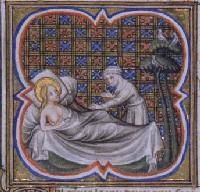 Elizabeth (Erzsebet, Elisabeth) of Hungary, born in Pressburg, Hungary, in 1207, was the daughter of King Andrew II and his wife Gertrude. Given in an arranged political marriage, she became wife of Louis of Thuringia (Germany) at age 14.
Elizabeth (Erzsebet, Elisabeth) of Hungary, born in Pressburg, Hungary, in 1207, was the daughter of King Andrew II and his wife Gertrude. Given in an arranged political marriage, she became wife of Louis of Thuringia (Germany) at age 14.Her spirit of Christian generosity and charity pervaded the home she established for her husband and three children in the Wartburg Castle at Eisenach. Their abode was known for hospitality and family love.
Elizabeth often supervised the care of the sick and needy, even giving up her bed to a leper at one time. Widowed at age 20, she arranged for her children's well-being and entered into life as a nun in the Order of Saint Francis. Her self-denial led to failing health and an early death in 1231 at the age of 24. Remembered for her self-sacrificing ways, Elizabeth is commemorated through the many hospitals named for her around the world.
Lection
† Psalm 146:4-9 or 112:1-9
† Tobit 12:6b-9
† Matthew 25:31-40 or Luke 12:32-34
Collect
Almighty God, by whose grace your servant Elizabeth of Hungary recognized and honored Jesus in the poor of this world, grant that we, following her example, may with love and gladness serve those in any need or trouble, in the name and for the sake of through Jesus Christ our Lord, who lives and reigns with you and the Holy Spirit, one God, now and forever.
 Tuesday's comments about the shooting of a sparrow that "threatened" a Guiness Book record-setting domino fall included the pretty-much rhetorical question, "How will animal 'rights' activists react to this wanton avian slaughter?"
Tuesday's comments about the shooting of a sparrow that "threatened" a Guiness Book record-setting domino fall included the pretty-much rhetorical question, "How will animal 'rights' activists react to this wanton avian slaughter?"Well, ask a rhetorical question, get a literal answer. "The Dutch animal protection agency demanded prosecution Tuesday for the shooting of a sparrow that knocked over 23,000 dominoes," notes a follow-up AP article in the Kansas City Star.
We might, for a momement, continue the truly serious comparisons of the value of a sparrow's life to that of a human. In an effort to appease the government and animal "rights" groups, the sponsoring television network has a suggestion: They are "considering some kind of memorial or mention for the dead bird in the television broadcast."
A televised funeral for a bird! "Wouldn't that," to quote Eliza Doolittle, "be loverly!" Let's put its feathers on display and call it macaroni. How about the innocent blood of Dutch victims of euthanasia, abortion, or "assisted" suicide having a chance to cry out?
 Silent pause to listen for Dutch response.
Silent pause to listen for Dutch response.Yeah, that's what I thought.
Of course, like so many serious issues, this one also has ridiculous overtones. Imagine my American eyes spying this tidbit: "The common house sparrow [is] a species on the [Netherlands'] national endangered list." Obviously, the Dutch don't have enough breeding and nesting areas for these birds.
I hear opportunity knocking upon the door of one of this nation's most opportunistic businesses (headquarters, Bentonville, Arkansas). Yes, I mean Wal-Mart. I've not been in a Supercenter anywhere in these United States that did not have a thriving sparrow population. Instead of being villainized for trampling Dutch culture and undercutting the Netherlands' small businesses, the proper marketing approach could set them up as environmental heroes.
Of course, Wal-Mart might not see enough of a profit motive to make such an effort. After all, who wants to try marketing to new customers when so many of them keep dying for the flimsiest of reasons?
I lie awake; I am like a lonely sparrow on the housetop. (Psalm 102:7 ESV)
 Surely a Dutch sparrow is mourning its mate on a housetop this evening. An AP article from the Kansas City Star notes that a sparrow was killed in the Netherlands for overturning "23,000 dominoes" which were being set up as part of an effort to set a world record domino fall.
Surely a Dutch sparrow is mourning its mate on a housetop this evening. An AP article from the Kansas City Star notes that a sparrow was killed in the Netherlands for overturning "23,000 dominoes" which were being set up as part of an effort to set a world record domino fall.Like a sparrow in its flitting, like a swallow in its flying, a curse that is causeless does not alight. (Proverbs 26:2 ESV)
Evidently, cursing wasn't enough. While gaps were built into the structure to prevent total meltdown in case of an accident, enough damage was done that someone called an exterminator with an air rifle.
Are not two sparrows sold for a penny? And not one of them will fall to the ground apart from your Father. (Matthew 10:29 ESV)
How will animal "rights" activists react to this wanton avian slaughter? Even I, not anywhere near a card-carrying member of PETA (nor even the ASPCA) wonder if death wasn't too harsh a punishment for a lost bird. Maybe they're a bit more than two for a copper these days, but their face value isn't that high. However, they are living creatures made by God and a domino fall — even one of over four million individual pieces — seems trivial next to the death of a non-threatening critter. And yes, as Jesus noted, the Father noticed this particular bird's falling.
Fear not, therefore; you are of more value than many sparrows. (Matthew 10:31 ESV)
Here's where a sick irony surfaces: The shooting death of one relatively insignificant little bird made international headlines. Meanwhile, the nation in which this happened stands as a world leader in allowing and supporting euthanasia and related crimes against humanity and sins against God. How many people "of more value than many sparrows" will die because they get in the way of what the rest of society wants to do?
 I know some Alzheimer's patients who literally could take out at least 23,000 dominoes without realizing what they've done. And speaking figuratively, how many other "dominoes" are being knocked over? Imagine all the mentally deficient, physically impaired, emotionally unstable people who interfere with the plans, hopes, and dreams of others — do we call the exterminator because they keep breaking up our party?
I know some Alzheimer's patients who literally could take out at least 23,000 dominoes without realizing what they've done. And speaking figuratively, how many other "dominoes" are being knocked over? Imagine all the mentally deficient, physically impaired, emotionally unstable people who interfere with the plans, hopes, and dreams of others — do we call the exterminator because they keep breaking up our party?Everyone who acknowledges me before men, I also will acknowledge before my Father who is in heaven, but whoever denies me before men, I also will deny before my Father who is in heaven. (Matthew 10:32-33 ESV)
After working to calm His disciples' worries about the way the world would view and treat them, Jesus followed up with this reminder: As we confess Him on earth, so He confesses us before His Father. To confess Him certainly means proclaiming His saving Gospel of forgiveness. Yet the confession is incomplete — indeed, it often falls on deaf ears — if the Law is not also clearly and forthrightly professed.
Yes, our God cares about a fallen sparrow. He cares about all of this fallen world. He cares about euthanasia, abortion, homicide, and suicide victims. He condemns those who commit violence or work death upon themselves or others.
We dare not stand to the side and say, "Go get 'em, God!" He tells us that the sin of murder, even if allowed by perverted earthly laws, begins with the inclination of sinful hearts. The hate we feel toward another … the grudging sense that another's presence is an "inconvenience" in our own lives … the resentment that a sibling or a coworker gets more credit than do we … all of these boil down to our passing judgment upon the lives of others relative to our own. Thus, all of these are, in God's eyes, murder most foul.
Our confession of the Son includes confession of our own sins and reception of His complete forgiveness. As His absolution sets us right, it also moves us to confess Him in this fallen world. He sends us "forgiven murderers" out to confront those who continue to spread death, arming us with His Word and Spirit.
Confessing Him, we testify against selfishness — from "How dare that bird knock down my dominoes!" through "How dare this lump of tissue growing in my uterus interfere with my career plans!" to "How dare Mom keep living without remembering anything in that expensive nursing home, spending down my inheritance!" — selfishness that leads to hateful thoughts and murderous outcomes. We also then forgive selfishness in others, as God forgives it in us.
God grant that we show our worth, a worth more "than many sparrows"; indeed, we are worth our purchase price, the "holy, precious blood and the innocent sufferings and death" of God's beloved Son, Jesus Christ. As He proclaims our worthiness to His Father, so we proclaim His judgment and His mercy on earth.
Added note: Comments continue in the next post.
St. Louis first baseman Albert Pujols captured the 2005 National League Most Valuable Player award.
Necessary Roughness hosts for next Lutheran Carnival. Friday night's the deadline, the details are at the main blog.
Amor et Labor provided this quiz, followed by reasons for compiling it. Respondents are to put an E next to those issues for which they would Die, a BE next to those items for which they would Divide, and an A next to those items that are okay to Disagree about. Then they are to add other issues to the list as necessary, post, and let the author know.
- Trinity E
- Divinity of Jesus E
- Literal Resurrection E
- Full Humanity of Jesus E
- Nature of the Lords Supper E
- Common Cup A
- Justification E
- Sanctification E
- Intinction BE
- Disposable Cups at Communion A (almost BE)
- Nature of Baptism E
- Age of Baptism E
- Mode of Baptism (sprinkling or dunking) A (unless forced to use one mode, then E)
- Necessity of Holy Spirit Baptism BE
- Ordination of Women E
- Ordination of Homosexual People E
- Sacramental Marriage BE
- Virgin Birth E
- Perpetual Virginity of Mary A
- Authority of Scripture E
- Authority of Tradition BE
- Inerrancy of Scripture E
- Use of Images in Worship E, BE, or A, depending upon how they are used or forbidden
- Contemporary Music in Worship BE or A, depending upon what music, where, and the like
- Specific Translation of Scripture A or BE (unless heretical, then E)
- Baptismal Regeneration E
- Decisional Regeneration E (not that I believe it it; but it is an esse)
- Supralapsarianism/Infralapsariansim (order of decrees) E
- Human Nature after the Fall BE to E
- Nature of the Atonement E (even if I don't fully understand it)
- One Person, two Natures E
- The Filioque BE
- Church Membership for Practicing Homosexual People E or A — Church membership for any practicing sinners?
- Millennium BE
- Primacy of the Word E
- Beer BE (almost E for doctrinal, not enjoyment reasons)
- Dancing BE (see previous)
- Playing Cards BE (see previous)
- Swearing BE
- Premarital Sex BE
- Postmarital Sex BE
- Healing continues BE
- Tongues continue BE
- Literal Hell E
- Literal Devil E
- The Rapture BE
- Apocrypha (inclusion in Canon) A
- James (inclusion in Canon) A
- Revelation (inclusion in Canon) A
- Private Confession BE
- Burial versus Cremation ??? Still pondering this one
- Divorce BE
- Entire Sanctification BE
‡ First of all, Whether a psychopath, too, can be saved at Amor et Labor got me thinking about a topic I'd never really considered. The comment which followed looked a bit deeper into the specifics of repentance.
‡ Next, I highly recommend With Regrets, All My Love to anyone practicing, studying for, or contemplating a Church vocation. The Internet Monk lays his soul bare as he speaks to himself, his family, his readers, and his God about choices made and the reasoning therein.
‡ In his Theology Geek Blog, Jason Evans examines the politics of religion, the religion of politics, and wrestles with questions of "devout" vs. "extremist" Muslims and Christians as he explores Freedom — For those who we agree with.
‡ Wanted: Driving Instructor: No Fear and Strong Belief in Immortality Required — the author of Haunted by the Holy Ghost shows how she's also more than a bit haunted by her daughter's learning to drive. It's fear and faith and white-knuckled laughter all the way.
‡ And this just in from The Lutheran Logomaniac, Pastor Todd Peperkorn: Wisconsin Allows Jesus in Prison? This update has strong bearing on a shameful, little-known fact: It's nearly impossible for American prisoners to receive the blood of Christ in Holy Communion due to institutional prohibitionism.
Is it just me, or is this the most varied collection to date?
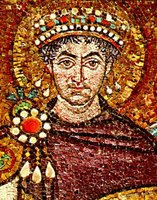 Justinian, Christian Ruler and Confessor of Christ, was emperor of the East from A.D. 527 to 565, during the time of decline of the Roman Empire. Aided by his beautiful and capable wife, Theodora, he restored majesty to the Byzantine court and is considered by historians to be the last true "Roman" emperor. During his reign the Empire experienced a renaissance, due in large part to his ambition, intelligence, and strong religious convictions.
Justinian, Christian Ruler and Confessor of Christ, was emperor of the East from A.D. 527 to 565, during the time of decline of the Roman Empire. Aided by his beautiful and capable wife, Theodora, he restored majesty to the Byzantine court and is considered by historians to be the last true "Roman" emperor. During his reign the Empire experienced a renaissance, due in large part to his ambition, intelligence, and strong religious convictions.Justinian also attempted to unite a sharply divided Church and was a champion of orthodox Christianity, seeking agreement among the parties in the Christological controversies of the day who were disputing the relation between the divine and human natures in the Person of Christ. The Fifth Ecumenical Council in Constantinople in A.D. 533 was held during his reign and addressed this disagreement. Justinian died in his eighties, without seeing the completion of his desire for a solidly orthodox Christian empire.
He is counted as a saint in the Eastern Church and certainly accomplished much. However, as with many renowned champions of the faith, Justinian also exhibited less than exemplary behavior at times. His "feet of clay" involved his overzealous attempts to forward or defend Christianity by fiat or force of arms. Yet he also supported legitimate missions and thousands were brought to faith in Africa and Asia Minor.
In parts of the world, including these United States, 11 November is a day of remembrance growing out of the end of World War I. It grew from the armistice ending western European hostilities in the First World War. This post title comes from the implementation of the armistice at 11:00 a.m. GMT on 11 November, 1918.
Originally known as Armistice Day (and still called this by some) the United States expanded the emphasis from gratitude for the end of the "War to End All Wars" to remembering and thanking all of our honorably discharged military personel. The US holiday was officially established as Veterans Day in 1954.
Spiritually, the "Great War" of the early 1900s ended much positive thinking about the upward climb of mankind and helped usher in the era of Modernism. The harshness of the "peace" which followed led to renewed hatred and hostilities in Europe. Coupled with the Great Depression, this helped to begin events leading to the Second World War.
The false hope much of the world, including many Christians, held for a utopian earth with no more armed conflict perished on the battlefields of these two world conflicts along with thousands upon thousands of armed combatants and millions of civilians. Wars and rumors of wars continue to testify against this fallen Creation and point to the final end of conflict, when our Savior returns in judgment.
We will still remember those who served honorably to defend the ideals upon which our Republic was founded. We will also continue to pray that America would return to much she has forgotten about both individual freedom and the interdependence of all citizens in a free society.
Martin of Tours, pastor and bishop of the Church, was born into a pagan family in what is now Hungary around the year AD 316. He grew up in Lombardy (a region in Italy) and came to the Christian faith as a young man. He then began a career in the Roman army. But sensing a call to a church vocation, Martin left the military and became a monk, affirming that he was "Christ's soldier."
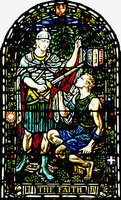 According to early stories, when he was 21, he passed the gates of Amiens and saw a man freezing on the side of the road. Taking pity on this man, Martin ripped his army issue cloak in half and gave it to the man to help comfort him. That night, Martin dreamt of Jesus Christ wearing that half cloak. This vision shook Martin to the core, no longer wanting to be part of the army, he succeeded in attaining a discharge from service.
According to early stories, when he was 21, he passed the gates of Amiens and saw a man freezing on the side of the road. Taking pity on this man, Martin ripped his army issue cloak in half and gave it to the man to help comfort him. That night, Martin dreamt of Jesus Christ wearing that half cloak. This vision shook Martin to the core, no longer wanting to be part of the army, he succeeded in attaining a discharge from service.Martin journeyed to the city of Poitiers where he met the bishop (later to be named Saint) Hilary and was baptized. Returning to Gaul, Martin found that the Arian heresy had taken a firm hold. He spoke out against it and was singled out for persecution and forced to flee. The same happened shortly thereafter to Saint Hilary. Martin fled to an island in the Tyrrhenian Sea, living as a hermit. In 361, Martin discovered that Hilary had regained his seat in Pontiers; this news moved Hilary to return to Gaul.
Hilary sent Martin to Leguge, a Benedictine monastery, to continue his ways as a hermit; there Martin spent the next ten years. In 371, the Bishop of Tours died and Martin was asked twice to assume that seat — he respectfully refused both times. Martin was tricked into coming to Tours to administer the Anointing of the Sick to a friend's wife. This time Martin was persuaded to accept the responsibility as Bishop of Tours. We remember him for his simple lifestyle and his determination to share the Gospel throughout rural Gaul, as well as his work as bishop in successfully staving off numerous heresies.
Incidentally, on St. Martin's Day in 1483, the one-day-old son of Hans and Margarette Luther was baptized and given the name "Martin" Luther.
Lection
Psalm 15 or 34:15-22
Isaiah 58:6-12
Matthew 25:34-40
Collect
Lord God of hosts, who clothed Your servant Martin the soldier with the spirit of sacrifice, and set him as a bishop in Your Church to be a defender of the catholic faith: Give us grace to follow in his holy steps, that at the last we may be found clothed with righteousness in the dwellings of peace; through Jesus Christ our Lord, who lives and reigns with You and the Holy Spirit, one God now and forever.
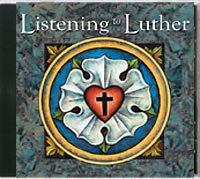 In honor of his natal celebration, Martin Luther doesn't get a birthday present: You do.
In honor of his natal celebration, Martin Luther doesn't get a birthday present: You do.Concordia Publishing House announced the release of Listening to Luther. This audio resource includes an audio recording of Luther's Catechism with the six catechetical hymns.
But wait! There's more! The CD also has a recording of "Lord Keep Us Steadfast."
And, if you want even more, those crazy folks at CPH have included a booklet with all the hymn lyrics and an explanation of each. Plus, as a special treat, the words of the Reformer are voiced through the mellow tones of historian, scholar, and pastor Kenneth Schurb.
How much would you expect to pay for such a product? $500? $250? $100? Hold on to your life's savings &mdash these 72 minutes of doctrinal and musical ecstasy are available for only $14.99!
Open a new window with this link to visit the CPH product page for Listening to Luther.
Thanks to Paul McCain for the heads-up.
A day after we celebrated the birth of the Second Martin, we remember that of the original. Yes, on this day in 1483, a baby boy was born in Eisleben to Hans and Margarette Luther.
The rest, as they say, was history.
 Today marks the birthday of Martin Chemnitz, Pastor and Confessor. We regard him as, after Luther, the Lutheran Church's most important theologian. He possessed a penetrating intellect and an almost encyclopedic knowledge of Scripture and the Church Fathers combined with a genuine love for the Church.
Today marks the birthday of Martin Chemnitz, Pastor and Confessor. We regard him as, after Luther, the Lutheran Church's most important theologian. He possessed a penetrating intellect and an almost encyclopedic knowledge of Scripture and the Church Fathers combined with a genuine love for the Church.Doctrinal quarrels after Luther's death in 1546 led Chemnitz to give himself fully to the restoration of unity in the Lutheran Church. He became the leading spirit and a principal author of the 1577 Formula of Concord, which settled the doctrinal disputes on the basis of the Scriptures and largely succeeded in restoring unity among Lutherans. Work on the Formula led Chemnitz and others to gather all the normative doctrinal statements confessed by the Lutherans, from the ancient creeds through the Evangelical writings of the 16th Century, into one volume, the Book of Concord.
Chemnitz also authored the four volume Examination of the Council of Trent (1565–1573). This monumental work saw him rigorously subjecting the pronouncements of this Roman Catholic Council to judgment by Scripture and the Church Fathers. The Examination is the definitive Lutheran answer to the Concilium Tridentinum and an outstanding exposition of the faith of the Augsburg Confession.
As theologian and a churchman, "the Second Martin" was truly a gift of God to the Church. This is why the expression was coined, Si Martinus non fuisset, Martinus vix stetisset. ("If Martin [Chemnitz] had not come along, Martin [Luther] would hardly have survived.")
 Way back in June, I discussed the on-going debate in the Kansas State Board of Education and the attitudes regarding the teaching of evolution in the state's public schools.
Way back in June, I discussed the on-going debate in the Kansas State Board of Education and the attitudes regarding the teaching of evolution in the state's public schools.Today, to the delight of some and the dismay of others, the Board of Ed made its new standards known. It will now be allowed (not mandated, mind you) to challenge, or at least make unflattering comparisons to pro-evolutionary dogma in the classroom. This doesn't mean that God has suddenly invaded Kansas classrooms: The AP story I read at Fox News notes, "The new standards contain an explicit disclaimer saying they're not designed to promote intelligent design...." Classroom teachers can, at least for now, pretty much still teach nothing but pure evolutionary theory.
 Still, those who make science their god will, at least in Kansas, face a bit more resistance as they attempt to bulldoze others' understandings and beliefs. "The board," says the AP, "rewrote the standards' definition of science, so that it is no longer limited to the search for natural explanations of phenomena." In other words, it looks like you can make a detailed, lab-tested examination of something and say, "There's no discernable natural reason why this happened." That's a long way from imposing religion, but at least it removes one form of institutionalized hostility toward people of faith who examine the evidence and see a universe too broad, too vast, too complicated, and too ordered to be explained in purely random, naturalistic terms.
Still, those who make science their god will, at least in Kansas, face a bit more resistance as they attempt to bulldoze others' understandings and beliefs. "The board," says the AP, "rewrote the standards' definition of science, so that it is no longer limited to the search for natural explanations of phenomena." In other words, it looks like you can make a detailed, lab-tested examination of something and say, "There's no discernable natural reason why this happened." That's a long way from imposing religion, but at least it removes one form of institutionalized hostility toward people of faith who examine the evidence and see a universe too broad, too vast, too complicated, and too ordered to be explained in purely random, naturalistic terms.So, what's changed? Probably not a whole lot. Governor Sebelius will continue to decry the Board of Education, claiming that the economic sky will fall. Voters will flip-flop on pro- and anti-evolutionary members for the Board of Ed in coming elections. Meanwhile, the evolution supporters will consider their opponents to be under-evolved pseudo-humans while the fundamentalist branch of the creationists will continually shoot themselves in the foot by trying to "prove" Jesus, the Bible, or Christianity by "proving" Creation rather than focusing on Christ so that His followers continually be led to "search the Scriptures (John 5:39 ESV)" and learn to believe that they "bear witness about [Him]" — a true and certain witness from Genesis through Revelation.
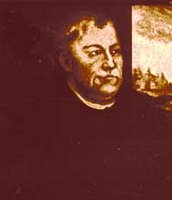 Today we remember Johann von Staupitz (ca. 1469–1524). Martin Luther's Father Confessor was vicar-general of the Augustinian Order in Germany. He befriended the troubled young man on numerous occasions, sending Luther deeper into the Scriptures while attempting to calm his troubled conscience.
Today we remember Johann von Staupitz (ca. 1469–1524). Martin Luther's Father Confessor was vicar-general of the Augustinian Order in Germany. He befriended the troubled young man on numerous occasions, sending Luther deeper into the Scriptures while attempting to calm his troubled conscience.Staupitz was born in Saxony, studied at the universities in Leipzig and Cologne, and served on the faculty at Cologne. In 1503 Frederick the Wise called him to serve as dean of the theological faculty at the newly founded University of Wittenberg. There, Staupitz encouraged Luther to attain a doctorate in theology and appointed him as his successor to professor of Bible. During Luther's early struggles to understand God's grace, it was Staupitz who counseled Luther to focus on Christ and not on himself.
In later years, Luther said, "If it had not been for Dr. Staupitz, I should have sunk in hell."
 Two listings are dropped because nothing's been added since way-too-long ago. One is from the now-completed Dare to Be Lutheran and I don't see it coming back. The other is a team blog where the team seems to have entered an extended off-season: Preaching Christ Crucified. Please inform me if it becomes active and I'll probably return it to the ranks. What's there was usually good, but isn't blogging supposed to be at least partially "in the moment"?
Two listings are dropped because nothing's been added since way-too-long ago. One is from the now-completed Dare to Be Lutheran and I don't see it coming back. The other is a team blog where the team seems to have entered an extended off-season: Preaching Christ Crucified. Please inform me if it becomes active and I'll probably return it to the ranks. What's there was usually good, but isn't blogging supposed to be at least partially "in the moment"?Now for the additions. In the confessional Lutheran category, you've been seeing for the past couple days a new, specially focused offering from Ste. Em. Sarah's Children is what the Deaconater calls "a blog devoted to those things which reveal Eve in Christ." Today, I've added two others, Scottius Maximus is here not only for his Lutheranism but also for his Cardinalism and is joined by fellow blogroll newbie, wherein Pastor Tim May writes exactly upon what his site title implies; i.e., On the Lutheran Church and Her Liturgy.
Two non-religious entries join the crew, also. Most of The Crazy Rants of Samantha Burns generally appeal to my way of thinking and to my sense of humor on so many levels while no real guy could ever ignore the Patron Saint of Boogers, Dave Barry.
I've a couple other Lutheran blogs I'm watching. If new content regularly appears to join the small bit of quality writing already posted, they'll be listed here soon.
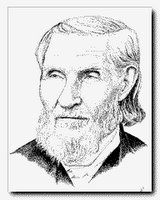 John Christian Frederick Heyer was born in Germany in 1793 and came to the U.S. at age 17, sent by parents intent upon keeping him away from Europe's Napoleanic struggles. He studied theology and became a home missionary in western Pennsylvania, Ohio, Kentucky and Indiana. He married at in 1819 but his wife died after only 20 years of marriage.
John Christian Frederick Heyer was born in Germany in 1793 and came to the U.S. at age 17, sent by parents intent upon keeping him away from Europe's Napoleanic struggles. He studied theology and became a home missionary in western Pennsylvania, Ohio, Kentucky and Indiana. He married at in 1819 but his wife died after only 20 years of marriage.In 1841, at the age of 48, after studying a bit of medicine and a bit of Sanskrit, Heyer was sent to Guntur, India, by the Ministerium of Pennsylvania as the first foreign missionary of the American Lutheran churches. He served in India for 14 years and founded a Baltimore, Maryland, congregation on his furlough. Heyer later returned to the U.S., serving as a missionary among Germans in Minnesota. He helped to organize the Minnesota Synod and continued such work by establishing new mission congregations throughout the Mississippi Valley before returning to India at the age of 77 to reorganize the mission in Rajahmundry.
A contemporary report says that Heyer was "able to administer with rare economy the scanty revenues of a mission in a time of scarcity." Returning to America, he served as House Father at the Philadelphia Seminary during his final years of life, until his death in 1873.
Yes, folks, the Tenth Edition of the Lutheran Carnival is ready for your reading at Carnival HQ.
Mark D. Roberts, whose work I discovered in September, is putting together a list of blogging pastors. He lists the following purposes:
- To encourage pastors to blog.
- To encourage people to read pastoral blogs.
- To help pastors get in touch with other blogging pastors.
- To help blogging pastors get out the word about their websites.
Follow the link to view the current list and find out how to add your own blog(s).
‡ As might be expected, the week following 31 October generates a Reformation-related response. As might not be expected, I turn to the Internet Monk and his Reformation Day Meditation, which laments Methobapticostal emotionalism eroding attendance and membership among the liturgical, "boring" heirs of the later Reformation. Among his general remarks are many that Lutherans should wisely heed.
‡ Amor et Labor then gives us Reformation Over? — The Quiz, which is a cross between a meme and homework. It asks you to evaluate various dogmatic positions and decide if you'd die for, divide the Church over, or allow as adiaphoron each of the teachings (or religious opinions) he lists.
‡ Hurricane Katrina and the mess in New Orleans seem to have triggered more discussion on race relations and associated topics. The CaribPundit (who happens to be very black) is also very upset with some of what passes as thought in parts of black American culture. Thus, I give you not one, but two of her comments. On being an 'authentic' black goes off on the issue of "Smart black students being accused of 'acting too white.'" She then verbally cudgels those who say that Justice Thomas "doesn't count as a black" in An asterisk.
‡ Dovetailing nicely with the CaribPundit's posts, the obviously non-black Bob Waters of watersblogged! examines interracial relationships and his own thoughts and feelings in light of comments by Bill Cosby and Shelby Steele in Getting down, and getting funky.
‡ Not race, but social class, becomes the hot-button topic for The Grateful Christian. The post From Status to Feelings examines how societal changes and psycho-social definitions might alter understanding of certain Scriptures.
‡ At What You Do, Do Quickly, we're led to examine the possibility that the Church Growth Movement, which often wraps itself in biblicism, isn't actually as guilty of denying Scriptural authority as any of the Lutheran libs who left with Seminex in It Is not True.
‡ The urukite, a confessional Lutheran soldier, offers a glimpse of Life in Iraq in the Autumn Time. My prayers continue that his and his people get home safely and soon.
‡ "If thy student offends thee, pluck out thine eye." Ste. Em Cures T-2's Itch features my favorite deaconess removing her acrylic eye in order to stop one of her students from sinning against her (and himself): It's Law and Gospel with gripping twists and interesting observations. Earlier posts at Quicunque vult will give you more of the flavor of T-2 and his companion, T-1.
‡ Dizziness leads some interesting tours through the Outer Rim Territories. Having done the married seminary student with kids routine myself, I started having flashbacks, cold sweats, and feelings of vertigo upon reading Falling further into the rabbit hole. Looks remarkably similar to the way my Aardvark hole did back in the early 1990s.
As always, those mentioned here today may claim their Golden Aardvarks at any time.

